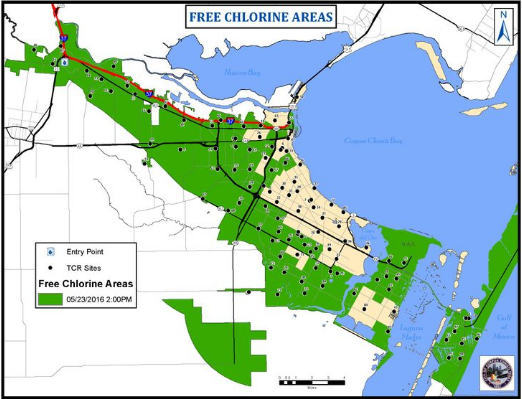
Chlorine movement through the city’s water system is shown in green as of 2 p.m. Monday, May 23.
Although a new chlorine treatment first pumped into the city’s water system last week has almost made it through all the pipes, the boil water notice has not been lifted. That news was announced at a special city council meeting Monday, May 23. The meeting was called as a question session for residents and council members. Available for the answers were city staffers and representatives from the Texas Commission on Environmental Quality, the agency that decides when to impose or lift a boil water notice.
Council members, particularly Colleen McIntyre, grilled TCEQ staffers about how much discrepancy the agency has when determining to place a boil water notice. She pointed out that in her research she found at least four other cities in the state with more cases of low chlorine levels that were not made to issue a notice.
“I’m trying to understand what our staff needs to know to prevent this,” McIntyre said. “We seem to be treated differently than other cities.”
Susan Clewis, TCEQ Regional Director, explained that Corpus Christi’s low readings came from several different areas and that the city was not able to respond within 24 hours to increase chlorine readings.
“We had 98 sites and only four or five were below .5,” McIntyre said. “Why was the boil water notice city wide when it’s obvious that certain areas are not effected and are even on a different pressure system?”
Clewis gave a somewhat testy response.
“Until the system seems to stabilize we have to protect the public health,” she said, before easing up a bit. “We are willing to work with ya’ll as you continue your investigation. We do sincerely want to work with ya’ll to solve this problem.”
Much of the discussion centered on what constitutes a dangerously low chloramine level. Chloramine is the disinfectant the city used until the new process was started last week with free chlorine, a chlorine disinfectant that is free of ammonia. All of the officials speaking said the lack of chlorine in the water was never dangerous.
While the city requires intervention when the chloramine levels dip below 1 milligram per liter, the state requirement is set at .5 milligrams. Federal standards are at .0. Only three of 98 testing locations showed a consistent drop of below .5 milligrams. The results show a lack of disinfectant, NOT the presence of bacteria, staffers pointed out. No dangerous bacteria were ever found in the water during testing.
“The biggest thing I take from this is that at no time were the reading levels unstable,” said council member Rudy Garza Jr. “At no time was the public in danger. According to federal standards, we were never in danger.”
Council members were also unhappy with a 10-year turnaround for capital improvement projects, specifically four elevated tanks necessary to help keep water flowing through the city’s system. The tanks could help keep chlorine distributed more evenly throughout the system. The money and need were stipulated in a capital improvement plan in 2007. Bids requests for two of the four tanks, which is all that is needed at this point reported staff, were just recently sent out. Once bids are awarded, the tanks will take nine months to construct.
Citizens were no happier than the council members. Some of the many speakers blasted the council, threatening to make their voices heard at the ballot box come November 8 when all eight city council seats are up for re-election.
Council members, especially the mayor, were conciliatory and polite to everyone. Residents wanted to know two main things: when will the boil notice be lifted and why are they having to pay for water they can’t use? Several asked for a break on the water charges for days when the boil water notice was in affect.
“I understand that it lessens the trust in our government and embarrasses what I consider a great city amongst its peers,” said council member Chad Magill. “I would like to ask each of you here in this room: Who has more clarity now than before they walked in here? I think progress is moving forward because each of us has spent time here today to find out what we can do to solve this.”
The boil notice won't be lifted until the all clear is given by TCQ, which will happen when the new disinfectant has reached all parts of the city. The council will consider the issue of reduced water rates at a later date. The next council meeting is set for Tuesday, March 31. Three council members will be absent, so any critical long term action on the water issue will be deferred to the next meeting June 14.





